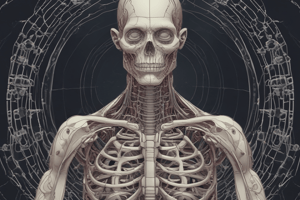Podcast
Questions and Answers
What is the most basic level of organization in the human body?
What is the most basic level of organization in the human body?
- Chemical level (correct)
- Organ level
- Tissue level
- Cellular level
Which directional term refers to a location closer to the midline of the body?
Which directional term refers to a location closer to the midline of the body?
- Lateral
- Distal
- Proximal
- Medial (correct)
What is the term for the region within the body that contains the heart and lungs?
What is the term for the region within the body that contains the heart and lungs?
- Cranial cavity
- Abdominal cavity
- Pelvic cavity
- Thoracic cavity (correct)
Which body region includes the arm, forearm, and hand?
Which body region includes the arm, forearm, and hand?
What is the term for the group of organs that work together to bring oxygen into the body?
What is the term for the group of organs that work together to bring oxygen into the body?
Which body system produces hormones?
Which body system produces hormones?
What is the primary function of the circulatory system?
What is the primary function of the circulatory system?
Which of the following is responsible for pumping blood throughout the body?
Which of the following is responsible for pumping blood throughout the body?
What is the term for the circulation of blood between the heart and lungs?
What is the term for the circulation of blood between the heart and lungs?
Which of the following blood vessels carries deoxygenated blood back to the heart?
Which of the following blood vessels carries deoxygenated blood back to the heart?
What is the highest pressure in the arteries, which occurs when the heart beats?
What is the highest pressure in the arteries, which occurs when the heart beats?
What is the smallest unit of the circulatory system where oxygen and nutrients are exchanged with cells?
What is the smallest unit of the circulatory system where oxygen and nutrients are exchanged with cells?
Flashcards are hidden until you start studying
Study Notes
Organization of the Human Body
- The human body is composed of several levels of organization:
- Chemical level: atoms, molecules
- Cellular level: cells, tissues
- Tissue level: groups of similar cells
- Organ level: structures composed of two or more types of tissues
- Organ system level: groups of organs working together
- Organismal level: the entire human body
Directional Terms
- Used to describe the location of body parts in relation to each other:
- Anterior (front)
- Posterior (back)
- Superior (above)
- Inferior (below)
- Medial (toward the midline)
- Lateral (away from the midline)
- Proximal (closer to the trunk)
- Distal (farther from the trunk)
Body Cavities
- Regions within the body that contain internal organs:
- Cranial cavity: contains the brain
- Vertebral canal: contains the spinal cord
- Thoracic cavity: contains the heart and lungs
- Abdominal cavity: contains the digestive organs
- Pelvic cavity: contains the reproductive organs
Body Regions
- Divisions of the body:
- Head: skull, face, and brain
- Neck: connects the head to the body
- Trunk: thorax and abdomen
- Upper limb: arm, forearm, and hand
- Lower limb: thigh, leg, and foot
Body Systems
- Groups of organs that work together to perform specific functions:
- Nervous system: controls body functions
- Circulatory system: transports oxygen and nutrients
- Respiratory system: brings oxygen into the body
- Digestive system: breaks down food for energy
- Endocrine system: produces hormones
- Integumentary system: protects the body
- Muscular system: moves the body
- Skeletal system: supports the body
- Urinary system: removes waste
- Reproductive system: produces sex cells
Studying That Suits You
Use AI to generate personalized quizzes and flashcards to suit your learning preferences.



